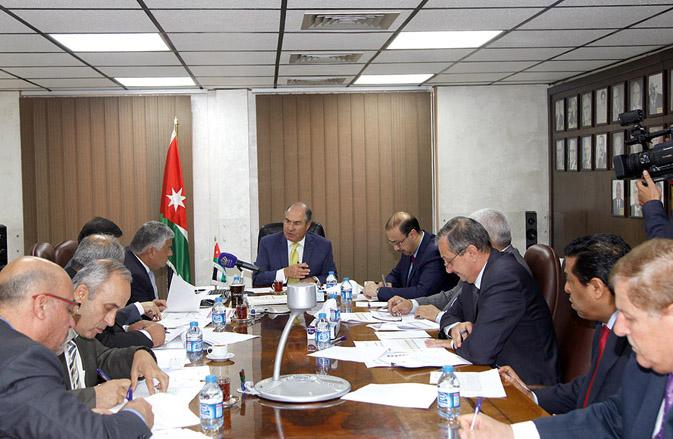You are here
2018 budget to allocate shares of governorates under decentralisation policy
By JT - Jul 19,2017 - Last updated at Jul 19,2017

Prime Minister Hani Mulki chairs a meeting at the Finance Ministry to discuss economic performance in the first half of the current year in Amman on Tuesday (Petra photo)
AMMAN — Prime Minster Hani Mulki on Tuesday said that he directed budget authorities to immediately start preparation of the public budget 2018, to take into account the budgets of governorate councils that will be elected in August, the Jordan News Agency, Petra, reported.
During a meeting at the Finance Ministry to discuss the macroeconomic indicators in the first half of the year, Mulki said that, after the local elections, the General Budget Department is expected to embark on discussions with local councils over their respective budgets, in light of the allocations determined by the Finance Ministry.
Citing Finance Ministry data for the first half of the year, the premier highlighted progress in the economic correction programme.
As part of a decentralisation strategy aimed at involving the public in the Kingdom’s districts in decision-making, governorate councils will have the authority to set developmental priorities in each governorate and manage their budgets, decided by the central government, in line with these priorities.
Allocations have to be decided according to transparent mechanisms and in a way that enables the councils to aptly serve developmental goals in their areas of jurisdiction, said Mulki.
He stressed that the various Finance Ministry departments should have plans in place to adjust their operations with the decentralisation era and their officials should be authorised to deal with local councils with flexibility.
The premier called for holding another meeting after three months to assess the state’s financial performance and ensure commitment to plans and programmes.
Mulki expressed appreciation for the ministry’s efforts in rationalising spending and increasing revenues, reflecting economic stability and the chances of improvement.
Economic indicators for first half of 2017
Following are the first half financial data announced by the Finance Ministry:
- Domestic revenues rose to JD3.323 billion in the first half this year from JD3.287 billion in the same period last year.
- Tax revenues decreased by JD52 million. Mulki noted that the new taxation rules went into effect on March 1.
- Overall public revenues reached JD3.441 billion compared with JD3.528 for the same period of 2016, due to a drop in foreign grants from JD241 million to JD118 million.
- Current spending went down to JD3.352 billion compared with JD3.419 billion in 2016's first half.
- The budget deficit (before grants) decreased by 24 per cent and by 1 per cent after grants.
- Public debt interests went down from JD422 million to JD388 million.
- The public debt decreased by JD200 million, down to JD26.4 billion with a ratio to GDP of 94.4 per cent.
Related Articles
AMMAN — Decentralisation is an advanced reform project to integrate citizens in prioritising economic, service and social projects and follo
AMMAN — The House of Representatives’ Financial Committee on Wednesday demanded that the JD300 million’s worth of allocated funds in the 201
AMMAN — Governorate councils are excluded from the government decision to trim off 10 per cent of the capital budget of all ministries and g














